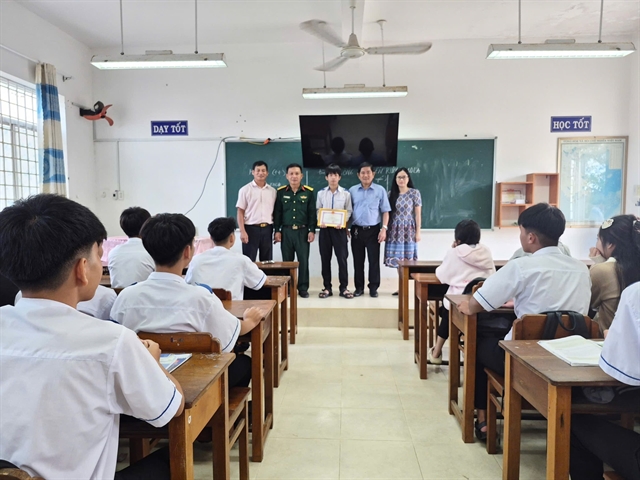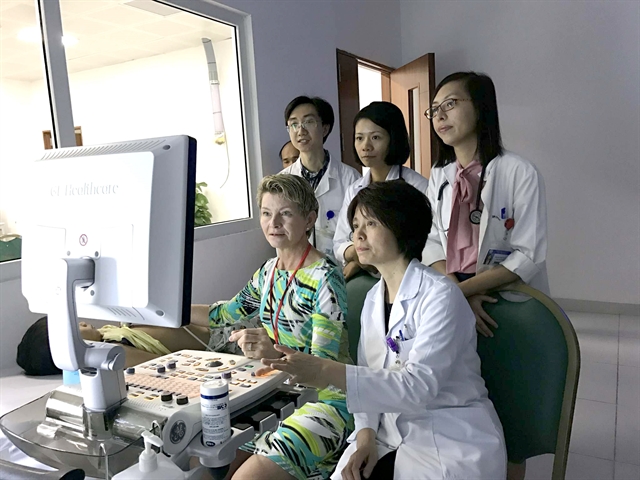 Society
Society

Associate Professor Trương Thanh Hương, senior lecturer at the Hà Nội Medical University and expert at the Việt Nam National Heart Institute under Bạch Mai Hospital, has been given Việt Nam’s 2020 Kovalevskaya Award for her contribution to helping thousands of people with cardiovascular diseases over many years.

|
| Associate Professor Trương Thanh Hương speak with a foreign colleague at work.— Photo suckhoedoisong.vn |
HÀ NỘI — Associate Professor Trương Thanh Hương, senior lecturer at the Hà Nội Medical University and expert at the Việt Nam National Heart Institute under Bạch Mai Hospital, has been given Việt Nam’s 2020 Kovalevskaya Award for her contribution to helping thousands of people with cardiovascular diseases over many years.
Hương is one of the country's leading medical experts, with many scientific works published.
Hương has conducted many studies related to congenital and genetic cardiovascular diseases, genetic pharmacology in individualising treatment of cardiovascular disease and development of new technologies in echocardiography. She has also chaired 19 scientific studies and published 75 scientific articles in domestic and international journals so far.
Hương is also the editor of 20 medical textbooks and documents.
Her two most outstanding scientific studies consist of the project "Building genetic mutation map of familial hypercholesterolaemia and proposing a disease management model in Việt Nam" and the project "Surveying some common polymorphisms of CYP2C19 gene related to Clopidogrel medicine’s response in people with coronary artery disease in Việt Nam”.
According to medical experts, the first project is a process of screening, diagnosis, genetic testing, genetic counselling and setting up a managing model of familial hypercholesterolaemia in Việt Nam. The project’s results have been transferred to medical facilities to serve healthcare.
Associate Professor Phạm Mạnh Hùng, president of Việt Nam National Heart Institute, said familial hypercholesterolaemia was a hereditary disease, affecting generations of a family and causing dangerous complications such as heart attacks and strokes in young people.
Worryingly, there were nearly 500,000 patients in the country contracting the disease. In the past, very few patients were detected and treated early, he said.
Hùng said they received many children with familial hypercholesterolaemia with dangerous complications. The study by Hương had assisted medical experts to detect the disease, quickly intervene and screen family members that had yet to suffer complications for early treatment.
The other project has already been transferred to producers to make a chip that could quickly diagnose the polymorphism of the CYP2C19 gene, he said.
It had helped hundreds of thousands of patients with coronary artery disease minimise complications and the risk of death as well as save annual medical expenses for the country, he said.
He also said that statistics showed that cardiovascular diseases were believed to cause the highest number of deaths, leading to the death of 18.6 million people worldwide; about four times higher than HIV, malaria and tuberculosis.
Hùng said data revealed that over 32 per cent of patients died of cardiovascular diseases in Việt Nam.
Therefore, cardiovascular-disease studies by Hương were very meaningful, contributing to improving treatment efficiency and reducing risks of death for patients with cardiovascular diseases, he said.
Also thanks to Hương’s studies, patients and their families had the opportunity to access optimal diagnosis and treatment, limiting the occurrence of cardiovascular complications, especially in adolescents, thereby helping to protect people's health, he said.
Doctor, teacher
Hương's father and mother worked for the military. When she was a child, she went with her father and saw many soldiers with injuries treated in poor conditions.
"The image stuck with me, inspiring my dream to become a doctor in the future," she said.
She studied hard and became one of the first two cardiologists to graduate from Hà Nội Medical University with excellent results. After graduation in 1987, she started to work as a lecturer at the university and a doctor at the Việt Nam National Heart Institute.
She was soon sent to Paris, France, to study Clinical Cardiology and Doppler echocardiography at the University of Paris and the Saint-Antoine Hospital and learn about congenital heart disease at the Robert Debré Hospital.
She returned to Việt Nam in 1997 and continued working at the institute and the university. Hương was given the Việt Nam’s Scientific and Technological Innovation Award in 2012 for her tireless efforts in scientific research.
As a senior lecturer at the university, she always renews her teaching methods. She applied modern teaching methods such as the Objective Structured Clinical Examination (OSCE) and Mini-Clinical Evaluation Exercise (Mini-CEX) for medical students, contributing to improve the quality of teaching and learning at the university.
She also actively participated in training high-quality human resources for the national health sector. She has directly trained more than 40 Ph.D, MBA and resident doctors and instructed and transferred advanced technologies to hundreds of doctors and medical staff at medical facilities across the country.
Hương works as a bridge for many young doctors and scientists to have the opportunity to access international scientific environments to study and improve their capacity, contributing to raising the quality of scientific research of Việt Nam.
She was given the title of “Excellent Teacher” in 2014.
Kim Ngọc Thành, a lecturer at the university and one of Hương’s students, said: “Hương is an honourable teacher for many generations of students.
"Not only enthusiastic about the profession and ready to teach all she knows to the next generation, she also helps young doctors have the opportunity to participate in major medical forums around the world.
“She gives us all her knowledge and experiences and always says she hopes we will teach all we know to the next generations as well,” he said.
Hương said: “Knowledge must be spread to really have great value and power.”
Hùng, president of Việt Nam National Heart Institute, said Hương completely deserved Việt Nam’s 2020 Kovalevskaya Award. The award is the driving force and a great encouragement for female scientists, who have devoted their whole life to contributing to society. — VNS




